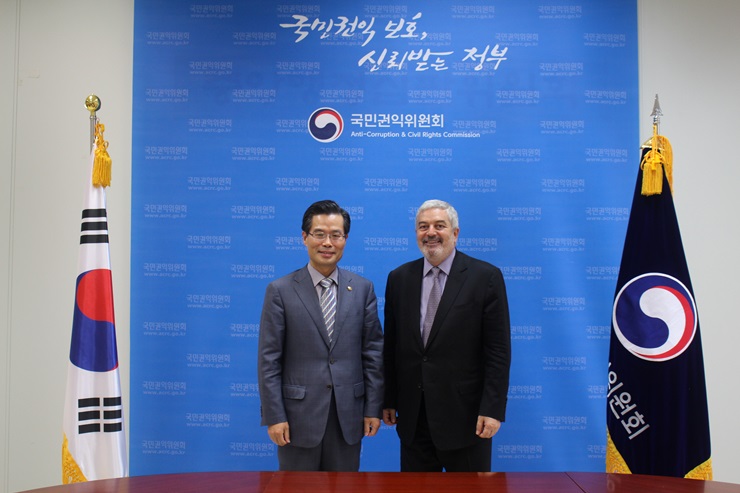News & Publications
Press Release
ACRC and UNDP agree to expand cooperation in anti-corruption
- Date2016-10-06
- Hit1,328

Kyung-ho Park, Vice Chairperson of the ACRC, met with Magdy Martínez-Solimán, Assistant Secretary-General of the United Nations and Assistant Administrator of UNDP, in Seoul on October 6, 2016. They agreed to keep working together to share Korea’s anti-corruption policies with the rest of the world.
Vice Chairperson Park pointed out that Korea, once one of the poorest countries in the world, has risen to become one of the world’s economic powerhouses during the period of operation of the UNDP Korea Office, and added that the support of UNDP has played a significant role in the process.
Assistant Administrator Martínez-Solimán said that the fight against corruption contributes to the 16th goal of the United Nations Sustainable Development Agenda, and also serves as a driving force behind the rebuilding of social trust and sustainable development. Given that Korea serves as an exemplary model for development, he believes the country’s experiences in national development will significantly contribute to the economic advancement of developing countries and their fight against corruption.
Currently, the ACRC and the UNDP Seoul Policy Centre (USPC) are working on a joint project to help Vietnam successfully adopt Korea’s system for "Anti-corruption policy assessment." At the invitation of the UNDP, the ACRC has participated in a number of events this year, including anti-corruption training for Egyptian high-ranking officials, an international conference on innovation in the public sector of Myanmar, and the Ministerial Conference of the Arab Integrity and Anti-Corruption Network, presenting the anti-corruption policy efforts of the Korean government.
The ACRC and the UNDP shared the view that their joint projects, including the abovementioned knowledge transfer for Vietnam, have accomplished substantial achievements so far.
During the meeting, Vice Chairperson Park said that the recently enforced "Improper Solicitation and Graft Act" has brought about significant changes in Korean society. He added that the Act will play a pivotal role in eradicating the widespread practice of improper solicitations and bribery, and consequently contribute to the development of Korea.
Martínez-Solimán commented that the Act laid the foundation for raising public awareness and promoting a corruption-free culture in light of the impact of the law on the culture as well as future policies.
The two parties agreed to discuss how to expand bilateral cooperation in many ways such as by dispatching staff members of the ACRC to the UNDP, so that Korea’s anti-corruption policies might be shared with countries around the world.









